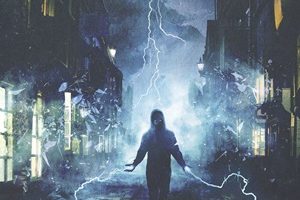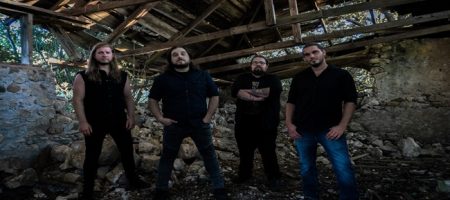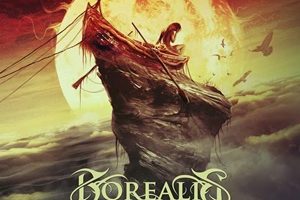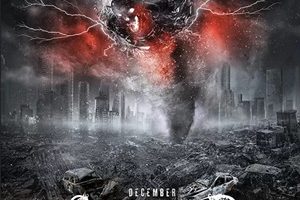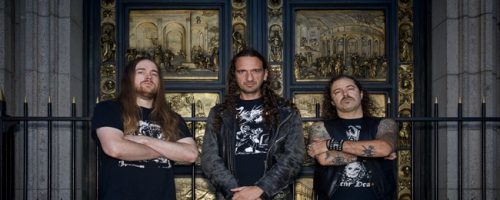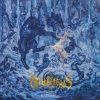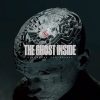Evergrey – Aching for Success
Sunday, 8th May 2022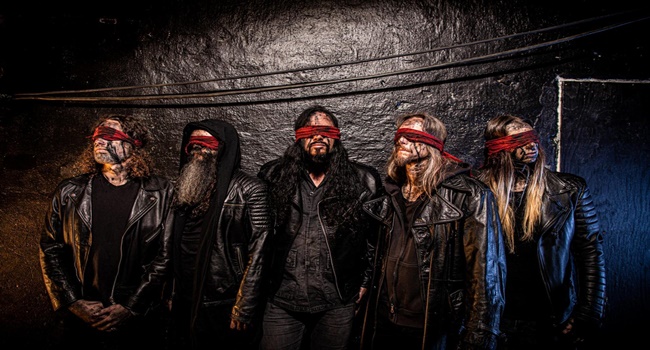
Continually churning out high quality albums, Evergrey set the bar high when it comes to their songwriting, vision, and execution of ideas. A power/progressive metal style that has dynamic elements, lighter and heavier when called for, packaged in such a moving way that their following continues to grow, expand, and reach multiple generations. Signing with Napalm Records, A Heartless Portrait (The Orphean Testament) is the thirteenth studio record, as the band wasted no time getting down to business when their touring schedule grinded to a halt because of the coronavirus.
We reached out to guitarist/vocalist Tom Englund on Zoom, and we covered a lot of ground in our brief time together. You’ll learn more about the band writing process, Tom’s development as a vocalist, their outlook on videos with long-time director Patric Ullaeus, his continual hunger for writing, creating, and delivering music, plus poignant thoughts as a result of working with cancer patients in a hospital.
Dead Rhetoric: A Heartless Portrait (The Orphean Testament) is the thirteenth Evergrey studio album – following quickly on the heels of last year’s awesome Escape of the Phoenix record. Did the lack of live touring and pandemic situation allow the band more time to just be creative and lock into this set of material? And how do you feel about starting out this new portion of your career on Napalm Records?
Tom Englund: Yes (laughs). To your answer to the first question, yes that was exactly the case. The day after the Escape of the Phoenix album came out, we sat down and had a band meeting. We decided maybe we should just go back to our writing dens and see if we have more inspiration to write more music since we won’t be able play music for a good while live, travel and so forth. That’s what we did – and it was a smart decision. Not only did we keep the inspiration going and kept being a band, which was a great way to stay relevant – and we also switched record labels. Which made it logical to have a new album come out as quickly as it did.
Everything has it’s time, I think. When you have been on a label for four albums you feel that it’s had it’s course in a sense. You know where you are going with that label, you know what to expect and what to not expect. When that contract was up, we figured let’s do something different, and we signed with Napalm.
Dead Rhetoric: And where did you come across with the lyrics this time – is it a logical continuation from the last record or something fresh and new again?
Englund: Everything is fresh and new every time. It’s not like we save anything. We have so many ideas musically for instance that just lie in the computer, probably 200 ideas over the years, but we never use a lot of them. If I would play them to you, you would think this would fit on an album, but for us it needs to be contemporary. It needs to be written in the time period of our lives we are at at the moment of writing it – and the same goes for the lyrics too. Each and every album of the thirteen we have made are a page out of a diary of my life, in a sense. It’s about the human context in different contexts. It’s new, fresh, and angry and sad, and all that stuff.
Dead Rhetoric: Were there any songs this time around that were more of a challenge to get through, especially from the demo stage to the final outcome?
Englund: I guess I would have to say no. We started writing and when we came back together the five of us, we had fifty song ideas to choose from. Jonas (Ekdahl) and I who produced the album, we started producing songs out of those ideas, and we came down to ten songs. This was the core foundation of the album. We then would discuss everything – this is a verse, let’s do that, back to our studios. Back and forth like that. We recorded the guitars at the time of writing them, same with the guitar solos, the vocals, the keyboards. When it was time for bass and drums, they had the background fully finished – and played to that which was a major improvement for them. That’s how we have worked over the last three albums. They had all the room in the world, but also stepped back when we were doing something else. It’s highly logical to do the vocals first, but often you put in the vocals last. Why?
Dead Rhetoric: Do you try to be spontaneous when it comes to the lead breaks you and Henrik lay down?
Englund: We are quite different, myself and Henrik. I’m very much, I like to compose my leads. I like to compare myself to Adrian Smith as a guitar player, outside of David Gilmour. They both have this melodic sense in their soloing, in each and every solo they have played throughout their entire career. And that’s how I view my own soloing. I like it to be musical and composed, whereas Henrik likes it to be wild, inspired in the moment, and crazy in that aspect. Which makes us have a great balance. It’s not about playing fast stuff, we can both play stuff that is fast, it’s about the composition of the solos.
Dead Rhetoric: How would you assess your evolution as musicians and songwriters this deep into the discography of Evergrey? Are there specific aspects or characteristics you spend more time and energy on to get the ideal feel and atmosphere you want track to track?
Englund: I would say first and foremost that if you have practiced for thirty years on something, you better hope that you are getting better at it. Otherwise, it’s just time to move on. With that said, for me personally I spent a hell of a lot of time working on my vocals, melodies, and perfecting them. It takes me from the initial idea of a vocal line to finishing the song about ten full days. Living with the song, it may be thirty days. I’m listening to it, singing it, I’m perfecting the notes, and then I put words to it. Which is also a weird process. I hum or pronounce words that aren’t even words, unconsciously. And then I find the words that sound like the words I want to sing, in the lyrical context, and work from that.
Dead Rhetoric: You’ve been able to establish your voice as one of the premiere, unique aspects to the appeal of Evergrey beyond the musical components. Where have you felt most comfortable as a singer, and are you continually training, learning, and expanding your range and dynamics as a vocalist from the start of Evergrey to now?
Englund: I was thrown into Evergrey being a vocalist also because we had our previous singer quit three weeks previous to recording our first album. It was like, ‘you sing!’. Year to year, probably for the first five albums I referred to myself as the guitarist in Evergrey, and I sing too. And now that has switched places. Now I feel extremely confident as a vocalist and writing those things. All of these other projects I am in – I am in Silent Skies as well, I have this low key, mellow, very atmospheric music where I can expand my voice, not in the harshness but a lower voice. I also sing in Redemption and that gets me to just sing that stuff, because Nick (Van Dyk) is the main writer in that band.
These different things help me develop my musicianship. Vikram and I also write music for video games, and that also helps me get that out of my system. I’m very ADHD when it comes to… my biggest fear in life is to die, and not having recorded all the music that I feel I have to write within me. That’s my aim – I have a hundred more albums to record and put out before I am gone. I’m going to have busy years, I guess.
Dead Rhetoric: Tell us about the video shoots for “Save Us” and “Midwinter Calls” – do you enjoy the process of not only performing but the magic that happens with specific scenery shots and acting that took place?
Englund: They are based on my ideas, and I am fortunate to be able to work with such a talented filmmaker as Patric (Ullaeus). We have made it super complicated this time. It’s a trilogy of videos, that we have released in reverse order to make it interesting for ourselves. Now we have released two, and the next video “Blindfolded” will have even more acting, and the story plot you will get for all three videos. I really enjoy doing this. The video recordings are interesting for us. We have done videos with Patric since 2001, it’s like two or three videos for every album. Just standing there and headbanging, we’ve done all that. We need to add some spice to it for ourselves.
Dead Rhetoric: Do you think the visual medium has been even more important now, due to the lack of live shows from the pandemic?
Englund: I think all cultural outlets… we are going to see great things coming from artists and painters and vocalists, filmmakers. We have had the time to pretty much use everything. I am waiting for all the authors to release their books now. Everyone has had so much more time on their hands. We are not use to this. As musicians we travel, assess what we need to do for the next album while we are in the air. It’s not really fair to the creative side, from a creative perspective. We should all have two years to make an album, and then tour, and get paid for all that too.
Dead Rhetoric: What are some of your most memorable fan interaction stories that have taken place due to the work of Evergrey? How does it make you feel to hear many times that your songs have helped people get through tough times in their lives and given them hope and strength to carry through?
Englund: Humble. That’s what it makes me feel. And it’s great to hear all those great words that you just said. I heard from a teenager; he was about 14 years old. He wrote to me, and he said he had been listening to Evergrey for a long time, and that I gave him a reason to carry on because I was proof that things would get better. That’s all I need. That is the reward for my whole career – that sentence.
Dead Rhetoric: Now that you are in your late forties, how would you assess your outlook as a musician – have you achieved everything that you set out to accomplish, or are there still specific goals or bucket list items that you want to achieve?
Englund: As I said, I want to release one hundred more albums and I am still aiming for world domination. Not in the Putin way, but in the musical way. I am as hungry, as eager, and as aching for success as ever, for people to hear our music as I was when I was 21. I just hope I am better at it, a humbler personality traveling the world, and all of that good stuff that you learn with age. I feel better than ever.
Dead Rhetoric: When you resume touring for Evergrey, will it be even more of a challenge to formulate a setlist in a headlining capacity, considering the latest two albums that I’m sure you’ll want to get a decent amount of exposure to beyond the established classics?
Englund: Yes, for sure. We need to take into consideration that since the Hymns for the Broken album in 2014, 70% of our fanbase is from that time period and onwards. I understand people love In Search of Truth and all of the great old albums, but they are twenty years old for us. Looking at the commercial aspect – if you look at the streams from In Search of Truth, and Recreation Day, and then take the first two songs from Escape of the Phoenix, you have more plays on those two songs alone versus those two albums. It has to be reasonable on the business side as well. These songs are where we have put our hearts out over the last four years. Really looking forward to basing a set list maybe on the last five albums. We are always going to keep one or two or three classic songs, that we don’t want to rid ourselves of.
Dead Rhetoric: Do you believe your fanbase has also grown with the times as far as consumption with the digital streaming/music, in addition to buying the physical product you offer?
Englund: There is a great balance between both – especially as we see all of these vinyl albums we release. All of them are sold out from our back catalog, and now there is a lack of plastic material in the world so you can’t print albums as quickly. We are lucky enough to have a fanbase that buys vinyl, merchandise, and all that stuff from us. We also have people that stream stuff too. All of our older fans still love our new stuff – it’s not like we are leaving anyone behind. We have fathers with their younger kids on their shoulders now, following our new stuff.
Dead Rhetoric: How do you see the state of power/progressive metal in the current scene? What is exciting to you – and what changes (if any) would you like to make to improve the marketplace on a global scale?
Englund: I don’t know if I’m that involved at all. I don’t have time to sort being in touch with what is new and what is going on out there. I just know that I like some songs from some bands, and when I am on tour that’s when I get to sit and indulge listening to music. When I am at home, I am working at all times – when I am on the tour bus, you can listen to music which is fantastic. There are an extreme amount of bands coming out that I’ve heard one or two songs from that I appreciate. Like Leprous, or Architects, or Lux Terminus. So many bands that are talented, and have things to say – that’s the most important thing I think.
Dead Rhetoric: What would surprise people to learn about Tom the person when you step away from your work and artistry as a musician?
Englund: That I am also a social psychologist, maybe. That is one of the things that people don’t know about me. I started studying for that in 2010 and I studied for over five years. While being on tour, it’s totally crazy. I worked as a hospital counselor for cancer patients. I have this good education if everything falls to crap.
Dead Rhetoric: Working with cancer patients in hospitals, did that give you a new perspective on the fragility of humanity?
Englund: Sure. Especially on what is important in life. The same way that if you asked people in the Ukraine today what is important, you would get decent and honest answers. Value your loved ones and your family. Keep your friends closer. Call people that you haven’t talked to in a while, do the things that you want to do. So many patients told me that they wished they had gone to theaters, watched ballet, movies, went to concerts, climbed a mountain.
Dead Rhetoric: When it comes to the catalog of Evergrey, what do you consider the benchmark, essential releases – and do you think there is an underrated one in the catalog that people need to go back and revisit that maybe didn’t get as much respect or success as originally anticipated?
Englund: The good thing about Evergrey is that we have this inclining curve. It’s like a flatline almost. We are always getting bigger for every album, so we’ve never had a dip. But, from a fan reception view, the older fans, Monday Morning Apocalypse was an album that people didn’t understand or give the chance. If they listened to that now, they would understand it is one of the darker works that we made. From a lyrical side of things, it was one of the darker periods in my life. We just pissed people off by saying it was produced by the same guy who produced Britney Spears, which was the truth. Metal fans were like, ‘what the hell is this’.
Dead Rhetoric: What are the plans for Evergrey over the next twelve months, or any other music endeavors that you have for Redemption, Silent Skies, guest appearances?
Englund: Silent Skies, we are writing the next album now. Redemption, we have mixed the album. We are just waiting with the vinyl. Evergrey, we will start touring in September. And tour for a good while, since we have two albums now to promote.













